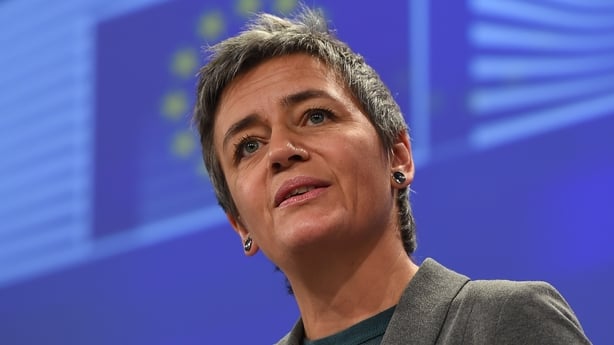The European Union has accused Google of cheating competitors by distorting internet search results in favour of its Google Shopping service.
The commission also said it is initiating a competition inquiry into its Android mobile operating system.
Competition Commissioner Margrethe Vestager said the US tech giant, which dominates internet search engines globally, had been sent a Statement of Objections - effectively a charge sheet - to which it can respond.
"I am concerned that the company has given an unfair advantage to its own comparison shopping service, in breach of EU antitrust rules," she said.
"If the investigation confirmed our concerns, Google would have to face the legal consequences and change the way it does business in Europe."
Responding in a blog post, the California-based company said that it "respectfully but strongly disagree" with the EU's statement of objections and would make the case that its products have fostered competition and benefited consumers.
It also defended its Android operating system, saying it was "a key player in spurring this competition and choice, lowering prices and increasing choice for everyone".
The commission, whose control of competition matters across the wealthy 28-nation union gives it a major say in the fate of global corporations, can fine firms up to 10% of their annual sales - or a penalty of over $6 billion for Google.
If it finds that companies are abusing a dominant market position, the EU regulator can also demand sweeping changes to their business practices, as it did with US software giant Microsoft in 2004 and chip-maker Intel in 2009.

Of the formal investigation into Android, used on smartphones and tablets, Ms Vestager said: "I want to make sure the markets in this area can flourish without anti-competitive constraints imposed by any company."
She announced the moves on the eve of a high-profile visit to the US, following five years of investigation and abortive efforts to strike a deal with Google by her Spanish predecessor, Joaquin Almunia.
However, the focus on the ranking of searches for shopping sites - Google has its own service called Google Shopping - did not address all the complaints lodged with the commission by competitors, large and small, in Europe and the US, who say Google has hurt their business.
Google initially has ten weeks to respond to the charges and can demand a hearing.
A final resolution, quite possibly involving court action if Google does not choose to settle, is likely to take many months and probably years.
Google's critics welcomed the decision to pursue the US giant, though many industry experts believe the action is unlikely to markedly shift existing business their way.
But by firing a hefty shot across Google's bows, it may favour competitors in new areas as technology develops.
That has been a priority for the new European Commission led by Jean-Claude Juncker, which wants to promote a more dynamic digital market in Europe and foster home-grown enterprises.
Mr Juncker is also pressing for a free-trade treaty with the US to bolster growth and Ms Vestager has stressed she is not seeking to penalise US firms or large companies, merely to avoid abuses of dominant market positions.
US President Barack Obama accused the EU in February of taking a protectionist stance against the US tech industry.
US domination of the internet and other new technology sectors has prompted a mixture of admiration and anxiety in Europe.
Germany, backed by major companies in the EU's biggest economy, has been particularly vocal in pressing the commission to act against Google, although major US rivals including Microsoft and Expedia also lodged complaints.
Google has put forward three proposals to resolve the case.
Most recently, just over a year ago, it offered to give competing products and services bigger visibility on its website, let content providers decide what material it can use for its own services and make it easier for advertisers to move their campaigns to rivals.
Almunia initially accepted that deal, only to reverse his decision six months later and demand more concessions, leaving the ultimate decision to his successor.
Anda sedang membaca artikel tentang
EU charges Google with market abuse
Dengan url
http://newsdeadlineup.blogspot.com/2015/04/eu-charges-google-with-market-abuse.html
Anda boleh menyebar luaskannya atau mengcopy paste-nya
EU charges Google with market abuse
namun jangan lupa untuk meletakkan link
EU charges Google with market abuse
sebagai sumbernya
0 komentar:
Posting Komentar